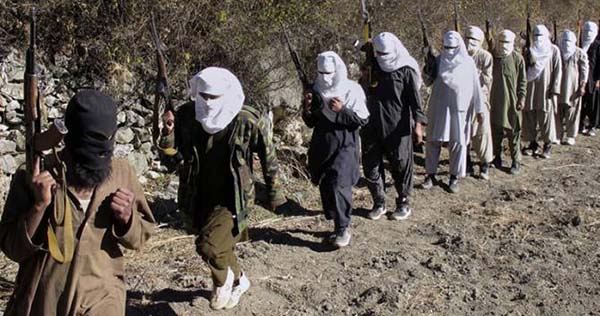Pakistan has asked the Taliban to immediately halt their spring offensive in Afghanistan. According to Pakistani media reports, the government of Pakistan has delivered a message to the Taliban leadership that if the group fails to stop the fighting immediately, it would face serious response from the governments of Pakistan and Afghanistan. Unnamed Pakistani official has said that the message has been sent through middlemen, and the Afghan government has also been notified on the issue. The news is coming at a time when Afghan National Security Forces (ANSF) are fighting against the bloody Taliban offensive resumed last month. The offensive has engulfed many Northern provinces as well as other areas across the country.
The capacity of the news is not fully clear yet. However, it suggests that the Pakistani government is starting to take some actions backing its pledge to help the Afghan government negotiate a peace deal with the Taliban leaders. The Pakistan has been recently employing the term “enemy of Afghanistan is Pakistan’s enemy”. During a visit to Afghanistan about two weeks ago, Pakistani Prime Ministers Nawaz Sharif condemned Taliban spring offensive, saying that the group would have no choice but to enter peace negotiations with the government of Afghanistan. Still, there has been no sign of the shared efforts of the Pakistani and Afghan governments paying off yet as the fighting continues in the country.
Despite all the pledges and assurances of supporting the Afghan peace efforts, so far there have been no concrete actions from Pakistan in persuading the Taliban to denounce violence and enter peace negotiations with the Afghan government. Violence in Afghanistan has escalated and the Taliban have been in resurgence in different parts of country particularly in the North after the group started its annual spring offensive.
With the escalation of violence, hopes for resumption of peace talks with the Taliban have been declining and many turning skeptical of Pakistan’s pledges for helping peace efforts in Afghanistan. For many in Afghanistan, the trend of developments has been discouraging as they remain skeptical of Pakistan’s cooperation. Recently, the Afghan government has been under heavy criticisms from many top political figures for its move to sign a cooperative agreement with Pakistan for intelligence sharing. However, the Afghan government has been steadily trying to engage with Pakistan seeking the country’s role for ending the long-lasting conflict in the country.
Many believe that the Taliban’s military setback and failure of their spring offensive could expedite the peace efforts and convince the Pakistani government to take practical actions in helping resumption of peace negotiations between Afghanistan and the militant groups. Despite that the Taliban considerably expanded the war front to the Northern Afghanistan, the group has been unable to secure key areas or have considerable success out of the offensive. In fact, the Taliban offensive is already considered a failure for the group as it has not met the group’s expectations for sweeping victories on the ground. Taliban expected to have lightening gains from the spring offensive they launched this year.
But such a scenario did not happen, and it is unlikely for the group to be able to make remarkable victories in the months to come as the tip of their sword is broken. Many believe the Afghan army fights much efficiently and effectively despite the numerous constraints and challenges it is facing. The ANSF has prevented a last-ditch victory for the Taliban and will likely to easily keep the militants at bay in the weeks and months ahead. This is leading many stakeholders to conclude that a tangible ground victory for the Taliban is impossible, and that the group had better to engage in peace talks with the government of Afghanistan.
However, it is quite premature to view the hints from Pakistan as a green light for the country’s full determination in seeking an end to the conflict in Afghanistan through persuading Taliban leaders into peace talks. However, any move that could help the process of peace negotiations with the Taliban should be welcome. It would be unrealistic if any party in Afghanistan and Pakistan expects a swift resolution of the conflict by Pakistan playing a role in the process. The nature of the Afghan conflict is not simply involving the Taliban, but, as President Ashraf Ghani has put it, it is also about the needless animosity between Afghan and Pakistani states.
Since a long time ago, there has been a shift of policy in Islamabad towards the Afghan conflict. The Pakistanis are convinced that peace can be restored in Pakistan only if there is peace and stability in the neighboring Afghanistan. Pakistani political elite and military establishment have realized that the country cannot end the militancy at home while it is being fed from a prolonged war in Afghanistan.
Despite the shift of Pakistan’s policy towards Afghanistan in recent years, still, the diverging policies of the two governments in the past prevented the two countries from reaching a common ground on how to kick-start the peace process in Afghanistan. The two countries have a long history of distrusts in mutual relations. Now the two governments are resolutely seeking a common and shared ground over the issue, and this is a remarkable achievement for the countries. Kabul and Islamabad now need to translate the diplomatic efforts into action plans for reaching concrete gains in the peace process with the Taliban.
Afghanistan needs to keep up military pressures against the Taliban. In the meantime, it should pro-actively seek Pakistan’s cooperation for resumption of peace talks with the Taliban. Much has changed in Islamabad for the good of the peace efforts in Afghanistan, and the government of Afghanistan needs to continue building up the achievements it has gained through diplomatic efforts so far.

